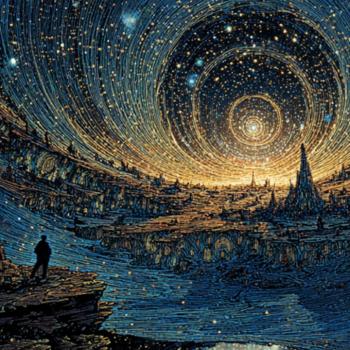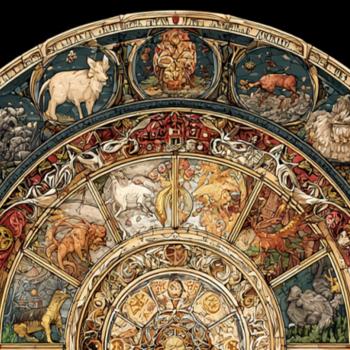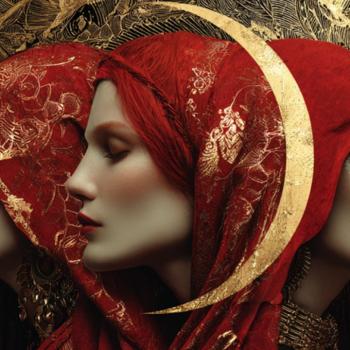
SAYING 45: Jesus said, “Grapes are not harvested from thorn trees, nor are figs gathered from thorn bushes, for those do not bear fruit. Good people produce good from their store. Evil people produce wicked things from their evil store within their hearts, and say wicked things. For out of the heart’s abundance they produce wicked things.”
Simply put, the fruit you produce in your life – your actions, your thoughts, your attitudes, your words – will reveal who you really are inside. So, as much as we may not like to admit it, it’s who we are on the inside that eventually rises to the surface for everyone to see.
When someone is caught doing something that might seem out of character, they might say, “This isn’t who I am,” and, in one sense they are right. It’s not in line with their identity as someone made in the image of God, or indwelled by the spirit of Christ. But, on another level, whatever embarrassing thing they may have done, or said, is a reflection of some darker shadow self that they have not taken the time to acknowledge, or to face.
This is why Carl Jung was so adamant that one must face and make peace with one’s shadow in order to fully become a whole person. Or, as he puts it:
“Filling the conscious mind with ideal conceptions is a characteristic of Western theosophy, but not the confrontation with the shadow and the world of darkness. One does not become enlightened by imagining figures of light, but by making the darkness conscious.” [From “The Philosophical Tree” pg. 335]
In other words, focusing on the positives doesn’t eliminate the negatives within us. We must confront our shadow self, look it square in the eye, and allow it become what it truly is: ourselves.
Whenever we deny our shadow self; pretend it isn’t there, or that it isn’t part of what makes us who we are, it only gives more energy and power to that shadow until one day, when we are not expecting it, the shadow self will reveal itself to our shame and horror.
Jung, again, reminds us that in order to really know ourselves, we have to commit to being completely honest with ourselves. As he says:
“Unfortunately there can be no doubt that man is, on the whole, less good than he imagines himself or wants to be. Everyone carries a shadow, and the less it is embodied in the individual’s conscious life, the blacker and denser it is. If an inferiority is conscious, one always has a chance to correct it. Furthermore, it is constantly in contact with other interests, so that it is continually subjected to modifications. But if it is repressed and isolated from consciousness, it never gets corrected.” [From “Psychology and Religion”, pg. 131]
Our shadow self can be compared to a toddler seeking a parent’s attention. If ignored, it becomes louder, and more outrageous until, eventually, the parent stops and turns to engage the child.
So, who we are deep down inside is revealed by what we say, what we do, how we act, and what sort of atmosphere we create around ourselves.
Our True Self and our Shadow Self are not two separate things. Remember, we’re trying to move away from that illusion of separation and divisions into good/bad, right/wrong, us/them. So, both the True Self and the Shadow Self are two sides of the same coin, not two different things. Both are a reflection of who we are inside. It’s not as if our True Self is all light and our Shadow Self is some foreign invader inside of us. Both of these are “us.”
That means whenever the Shadow Self slips out into the daylight, it’s no mistake. Rather, it’s an indication that we have ignored our Shadow and must take the time to make peace with that part of ourselves we would rather not admit is part of us.
Once again, quoting Jung:
“Everyone carries a shadow, and the less it is embodied in the individual’s conscious life, the blacker and denser it is. At all counts, it forms an unconscious snag, thwarting our most well-meant intentions.”
So, no matter who you say you are, or who you project outwardly to the world that makes you who you are. Those are hopeful illusions. No, it’s who you really are inside that bears fruit – both sweet and sour – for everyone to see and experience, whether you like or not.
The fruit you bear comes from the core of your identity within. We are all both light and shadow. None of us is all darkness, or all light. That’s the good news. Our shadow does not suggest we have no light within us, but our light does not eliminate the darkness either. Both co-exist within each and every one of us.
People may know who you are by how you make them feel – whether good or bad – because, like it or not, your life reflects your inner reality. Your actions are orchestrated by the music that plays in time with the metronome of your soul.
Once you know who you are inside – who you really are – you’ll discover a more sincere and honest version of yourself that bears the good fruit and sustains the equilibrium between the light and the shadow.
**
INSIDE/OUTSIDE: The Gospel of Thomas
Curious about the Gospel of Thomas? This course will examine select sayings of Jesus from this text, and explain why it’s not a true “Gospel”, not truly “Gnostic” and yet, quite possibly, an authentic collection of the secret teachings from Jesus recorded by his disciples. Plus, an exploration of why the text was buried in 367 AD and uncovered in 1945.
22 Lessons. Self-paced. Start anytime. Content never expires. Only $19.99
REGISTER TODAY>
Keith Giles is the best-selling author of the Jesus Un series. He has appeared on CNN, USA Today, BuzzFeed, and John Fugelsang’s “Tell Me Everything.” His latest book, SOLA MYSTERIUM: Celebrating the Beautiful Uncertainty of Everything is available now on Amazon in paperback and on Kindle.













